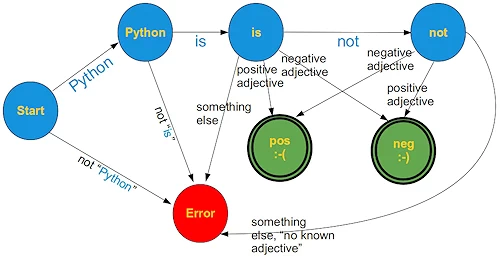8. Finite State Machine in Python
By Bernd Klein. Last modified: 01 Feb 2022.
A "Finite State Machine" (abbreviated FSM), also called "State Machine" or "Finite State Automaton" is an abstract machine which consists of a set of states (including the initial state and one or more end states), a set of input events, a set of output events, and a state transition function. A transition function takes the current state and an input event as an input and returns the new set of output events and the next (new) state. Some of the states are used as "terminal states". The operation of an FSM begins with a special state, called the start state, proceeds through transitions depending on input to different states and normally ends in terminal or end states. A state which marks a successful flow of operation is known as an accept state.
Mathematical Model
A deterministic finite state machine or acceptor deterministic finite state machine is a quintuple
(Σ,S,s0,δ,F),
where:
- Σ is the input alphabet (a finite, non-empty set of symbols).
- S is a finite, non-empty set of states.
- s0 is an initial state, an element of S.
- δ is the state-transition function: δ : S x Σ → S
- (in a nondeterministic finite state machine it would be δ : S x Σ → ℘(S), i.e., δ would return a set of states). (℘(S) is the Power set of S)
- F is the set of final states, a (possibly empty) subset of S.
Live Python training
A Simple Example
We want to recognize the meaning of very small sentences with an extremely limited vocabulary and syntax.
These sentences should start with "Python is" followed by
- an adjective or
-
the word "not" followed by an adjective. e.g.
"Python is great" → positive meaning
"Python is stupid" → negative meaning
"Python is not ugly" → positive meaning

A Finite State Machine in Python
To implement the previous example, we program first a general Finite State Machine in Python.
class StateMachine:
def __init__(self):
self.handlers = {}
self.startState = None
self.endStates = []
def add_state(self, name, handler, end_state=0):
name = name.upper()
self.handlers[name] = handler
if end_state:
self.endStates.append(name)
def set_start(self, name):
self.startState = name.upper()
def run(self, cargo):
try:
handler = self.handlers[self.startState]
except:
raise InitializationError("must call .set_start() before .run()")
if not self.endStates:
raise InitializationError("at least one state must be an end_state")
while True:
(newState, cargo) = handler(cargo)
if newState.upper() in self.endStates:
print("reached ", newState)
break
else:
handler = self.handlers[newState.upper()]
This general FSM is used in the next program:
positive_adjectives = ["great","super", "fun", "entertaining", "easy"]
negative_adjectives = ["boring", "difficult", "ugly", "bad"]
def start_transitions(txt):
splitted_txt = txt.split(None,1)
word, txt = splitted_txt if len(splitted_txt) > 1 else (txt,"")
if word == "Python":
newState = "Python_state"
else:
newState = "error_state"
return (newState, txt)
def python_state_transitions(txt):
splitted_txt = txt.split(None,1)
word, txt = splitted_txt if len(splitted_txt) > 1 else (txt,"")
if word == "is":
newState = "is_state"
else:
newState = "error_state"
return (newState, txt)
def is_state_transitions(txt):
splitted_txt = txt.split(None,1)
word, txt = splitted_txt if len(splitted_txt) > 1 else (txt,"")
if word == "not":
newState = "not_state"
elif word in positive_adjectives:
newState = "pos_state"
elif word in negative_adjectives:
newState = "neg_state"
else:
newState = "error_state"
return (newState, txt)
def not_state_transitions(txt):
splitted_txt = txt.split(None,1)
word, txt = splitted_txt if len(splitted_txt) > 1 else (txt,"")
if word in positive_adjectives:
newState = "neg_state"
elif word in negative_adjectives:
newState = "pos_state"
else:
newState = "error_state"
return (newState, txt)
def neg_state(txt):
print("Hallo")
return ("neg_state", "")
m = StateMachine()
m.add_state("Start", start_transitions)
m.add_state("Python_state", python_state_transitions)
m.add_state("is_state", is_state_transitions)
m.add_state("not_state", not_state_transitions)
m.add_state("neg_state", None, end_state=1)
m.add_state("pos_state", None, end_state=1)
m.add_state("error_state", None, end_state=1)
m.set_start("Start")
m.run("Python is great")
m.run("Python is difficult")
m.run("Perl is ugly")
OUTPUT:
reached pos_state reached neg_state reached error_state
Live Python training
Upcoming online Courses
24 Feb 2025 to 28 Feb 2025
31 Mar 2025 to 04 Apr 2025
07 Apr 2025 to 11 Apr 2025
19 May 2025 to 23 May 2025
02 Jun 2025 to 06 Jun 2025
30 Jun 2025 to 04 Jul 2025
11 Aug 2025 to 15 Aug 2025
10 Mar 2025 to 14 Mar 2025
07 Apr 2025 to 11 Apr 2025
23 Jun 2025 to 27 Jun 2025
28 Jul 2025 to 01 Aug 2025
12 Mar 2025 to 14 Mar 2025
09 Apr 2025 to 11 Apr 2025
04 Jun 2025 to 06 Jun 2025
30 Jul 2025 to 01 Aug 2025
Efficient Data Analysis with Pandas
10 Mar 2025 to 11 Mar 2025
07 Apr 2025 to 08 Apr 2025
02 Jun 2025 to 03 Jun 2025
23 Jun 2025 to 24 Jun 2025
28 Jul 2025 to 29 Jul 2025
